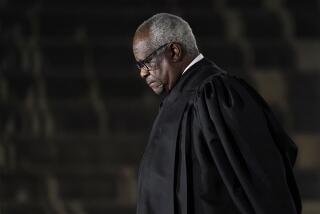Sound Ethics Haven’t Been Ruled Out
- Share via
The Supreme Court’s decision in April to reject the legal theory behind the prosecution of a company for giving gifts to former Agriculture Secretary Mike Espy must mean that all gifts short of a direct bribe to public officials are now perfectly proper, right? Wrong.
The unanimous decision of the high court to overturn the conviction of Sun-Diamond Growers, which gave Espy gifts worth approximately $5,900, was based on the court’s reading of the 1962 federal gratuity statute relied on by independent counsel Donald C. Smaltz. It was not a rejection of the principle that public officials must be held to high ethical standards and avoid the appearance of corruption. The practice of giving gifts to curry favor is at the core of Washington’s influence-money culture. Overall, Espy received $33,000 from various lobbyists. Opinions about Espy’s ethics or Smaltz’s judgment in bringing a criminal prosecution aside, anyone who believes that corporations and lobbyists lavish a Cabinet secretary with gifts worth tens of thousands of dollars just to be friendly is dangerously naive.
The Supreme Court’s decision made clear that the gratuity statute Smaltz employed against Sun-Diamond was just too ambiguous to hang a conviction on. Justice Antonin Scalia wrote for the court that the law’s “insistence upon an ‘official act,’ carefully defined, seems pregnant with the requirement that some particular official act be identified and proved.” When there was no evidence of the gifts being given to Espy in exchange for a particular official act, no “quid pro quo,” the case fell apart under the court’s reading of the statute. But Scalia also made clear that Congress could craft a better, clearer statute, pointing out that the other regulations in the field of government ethics are proof that when it wants to, Congress knows how to write “precisely targeted prohibitions” involving gifts to federal officials.
Scalia couldn’t be more right. Congress should quickly begin work to clarify and strengthen the statute, to make sure that it covers not just blatant offers of quid pro quo, but also the appearance of impropriety that thousands of dollars in gifts to a public official inevitably creates in the public’s mind. For that task, there are working models close to home--the federal ethics rules that have been in effect since the late 1970s and the Senate gift rules we passed in 1995.
Amazingly, some have speculated that the court’s reading of the gratuity statute could somehow affect the House and Senate gift rules. Leading the speculation are the Washington regulars who could benefit most from a meltdown in the congressional gifts rules: the professional lobbyists. No one has cheered the Supreme Court’s decision more loudly than the American League of Lobbyists. But their reading of the court’s decision as an opportunity to gut the gift rules on Capitol Hill has it backward: In fact, the ruling is an opportunity for Congress to bring the laws governing other federal officials back up to a high standard that will inspire public confidence.
While no rule is perfect, the federal ethics rules have worked for years to prevent federal employees from accepting gifts from persons or parties that have an interest in their official work. And the Senate gift rules have put an end to much of the expensive schmoozing that the public rightly frowns on: fancy vacation trips with lobbyists, lavish meals and high-priced tickets to sporting or entertainment events.
While the Espy case turned out to be a lemon, there’s still a chance to make some lemonade out of the Supreme Court’s ruling. Congress should take the court’s invitation and have another look at the federal gratuity statute. If it does so quickly, it can renew a small piece of the public’s faith that our government’s decisions are truly based on the merits, not the money.
More to Read
Get the L.A. Times Politics newsletter
Deeply reported insights into legislation, politics and policy from Sacramento, Washington and beyond. In your inbox twice per week.
You may occasionally receive promotional content from the Los Angeles Times.










